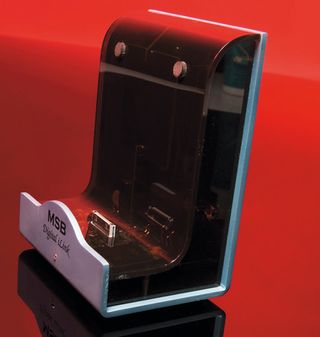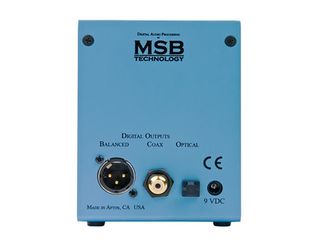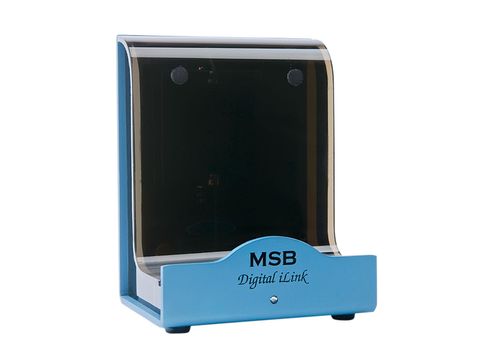TechRadar Verdict
MSB has taken the iPod to a level that no one suspected was possible. It has created a digital music server that has fabulous design and great sound when connected to a good-quality DAC. The only barrier to world domination is its price
Pros
- +
Turns the iPod into a high-fidelity music server
- +
Gives you the option of using if from your armchair
- +
Listening doesn't get much better
Cons
- -
Only works with modified fifth-gen iPods
- -
Only partial remote operation is possible
- -
Could well make your CD player obsolete!
Why you can trust TechRadar
MSB's iLink iPod dock and modification, which is currently limited to fifth-generation iPod classics only, changes the player itself, allowing it to output a proper S/PDIF digital signal, although the iPod continues to function in the normal way.
Wadia's competing 170iTransport can be used with a wide range of standard iPods because it extracts a USB output from the player. While this works well – much better than using the iPod's onboard DAC, in fact – if you've ever compared the USB output of a laptop with a digital output from the same source, you'll know it isn't the last word in fidelity.
This is partly why the iLink is so expensive for a dock, because it isn't just that – it's a modified iPod classic as well.
MSB says that the current generation of classics are not suited to the application because it's so difficult to open them up without damage. Unfortunately, it doesn't bode well for anyone wanting to replace a battery, but that's always been an iPod issue.
MSB's argument is that by modifying an iPod so that it emits a digital output and carefully treating it, this ubiquitous personal audio device is capable of results that can equal a CD transport. Controversial stuff, especially as MSB makes such a transport itself.
The company also considers the iPod to be the best audio server available today because it's inexpensive, superbly designed and – with the company's intervention – capable of high-quality sound. If it's more than competition for CD transports, it's trouble for music servers, too.

The iLink also has a feature that you don't see in other docks: it can transmit its signal via RF when you stick a small transmitter into the iPod. This allows the selection and playback of tracks from an armchair. Sound quality is improved if the player is placed in the dock, but it's still a useful feature.
MSB has recently added the option to upsample the iLink's digital output to 176.4kHz or four times CD's 44.1 sampling rate. This is an unusual feature in what is effectively a transport, because so few DACs accept a digital signal above 96kHz.
MSB naturally offers this option on its Platinum DAC III, so the upsampling option on the iLink will clearly be of interest to owners of this converter. The point is, however, that MSB continues to work on upgrades to the iLink as well as its other hardware. These upgrades can be retro-fitted, should you end up with a suitably equipped DAC in future.
Sound quality
The iLink was largely used with an MSB Platinum DAC III – an extremely revealing and inevitably expensive device – so we also used Russ Andrews' sadly discontinued DA-1. What both converters revealed is that the iLink is as good a transport as most CD players.
In fact, we only found one transport that clearly betters it – the ($11,000) EMM Labs TSD1 CD/SACD transport, a very expensive piece of kit that would be hanging its head Detail in shame had the result come out any other way.
With decent CD players like Leema's Antila II, the difference between it and the iLink – with both going through the MSB DAC – is only apparent on very resolute equipment. If anything, the extra openness and depth resolve of the iLink trumps the greater drive and bass weight of the Antila II. Some will prefer the latter, but the iLink is the more revealing – just.
This and other comparisons were made by putting WAV files of CD tracks onto the converted iPod classic, as this uncompressed file type gives the highest fidelity at the expense of using significantly more HDD real estate than compressed formats.
Of those supported by the iPod, Apple Lossless is the best we've heard. Files of the same material on this and WAV are, to all intents and purposes, sonically identical, which is handy if you want to put more music onto the player. It's important to set up iTunes as per MSB's instructional video if the application is going to provide the requisite quality to make the iLink sing, but this is straightforward.

OBVIOUS: The iLink's few connections are clearly labelled, but you'd be hard pressed to get these three confused anyway
We did a bit of listening using the Russ Andrews DA-1 converter with a Cambridge 840C as a transport. It's a comparison that makes the iLink sound refined and the disc player a little bit too lively and raw, but never short on energy.
The iLink is also energetic, but adds less of its own character to proceedings, an approach that lets a lot more of the detail through and produces a three-dimensional soundstage of impressive solidity and depth.
We also used it as a benchmark when assessing the Wadia 170iTransport and it came out of that comparison rather well, even considering the price disparity. in essence, if you have a decent system the iLink will equal or better your current source if used with a decent DAC, while the 170iTransport is unlikely to upset the pecking order.
Putting a standard 44.1 iLink up against one with the 176.4 upsampling upgrade results in a subtle advantage for the latter, with a slight improvement in focus and the removal of a digital haze around notes.
It takes a bit of listening for, but it's clearly there – if you have the MSB DAC, the low cost of the upgrade is like a small price to pay. In fact, there was talk from distributor ABC Audio of offering this at no extra cost if taken at the time of purchase.
One surprising discovery that we made when using the 176.4 unit is that this sample rate can be transmitted via an RCA coax interface. Since the days of DVD-A, we had been under the impression that coax cables and RCA phono plugs are limited to 96kHz. Now, according to MSB, the latest transmitters and receivers have pushed that figure up to an impressive 192kHz.
MSB might call iLink a 'digital music server', but it is more than that. Combined with a good-quality DAC, it is a source that can compete with any other in the digital field. Yes, it's expensive and you need a computer to get music onto the iPod, but you'll ultimately have a digital source of outstanding resolution. To think that we audiophiles dismissed the iPod as just another gadget!
Follow TechRadar Reviews on Twitter: http://twitter.com/techradarreview

An incredible $100 billion bet to get rid of Nvidia dependence — tech experts reckon Microsoft will build a million-server strong data center that will primarily use critical inhouse components

The real total eclipse was better than the pics I shot with my iPhone 15 Pro Max and DSLR, and believe me I tried

Quordle today – hints and answers for Sunday, April 14 (game #811)
